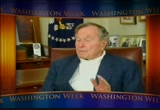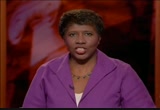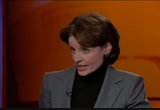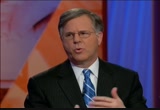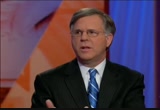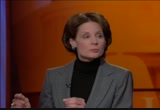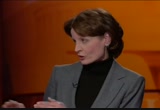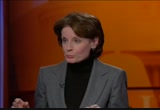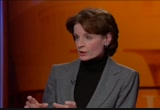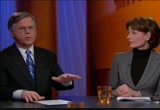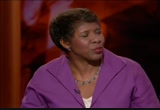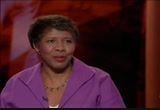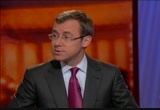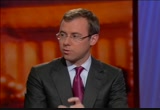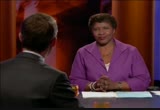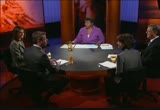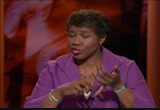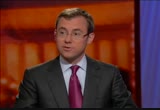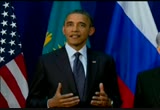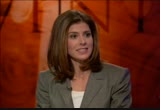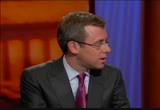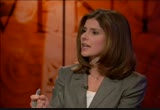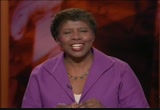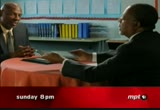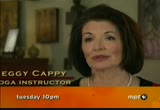tv Washington Week PBS March 31, 2012 1:00am-1:30am EDT
1:02 am
1:03 am
provided by norfolk southern. additional funding is also provided by the annenberg foundation, the corporation for public broadcasting and by contributions to your pbs station from viewers like you. thank you. once again, live from washington, moderator gwen ifill. gwen: good evening. it took three days of legal debate, street protest and a hours of arguments and now the supreme court gets to explain why it will uphold, gut, or completely overturn the nation's landmark health care law. the justices and the lawyers took turns comparing the health insurance market to everything from broccoli to automobiles, but chief justice john roberts wasn't necessarily buying. >> the key to the government's argument to the contrary is that everybody is in this market. everybody is in this market, so that makes it very different than the market for cars or the other hypotheticals that you came up with, and all they're regulating is how you pay for it. gwen: justice anthony kennedy,
1:04 am
once again a potential swing vote, apparently had the same problem. >> the government tells us that's because the insurance market is unique. and in the next case, it'll say the next market is unique. but i think it is true that if most questions in life are matters of degree, in the insurance and health care world, both markets -- stipulate two markets -- the young person who is uninsured is uniquely proximately very close to affecting the rates of insurance and the costs of providing medical care in a way that is not true in other industries. that's my concern in the case. gwen: so did this debate about taxes and mandates and severability and medicaid boil down to matters of degree? joan? >> it will, because the two justices you just showed are probably going to decide this case. it will be a close call, don't you think? >> absolutely. >> and it will probably be in the hands of the chief justice of the united states and anthony
1:05 am
kennedy and the two clips you showed, gwen, were ones that would lead viewers, listeners, those of us in the courtroom, to think that they might buy the government's case, but at the same time, there were enough comments that made it look like they could side with the challengers. as you know, they took a preliminary vote on friday and there will be so much going on over the next couple of weeks where they'll actually now start trying to argue among themselves and the persuasion that we saw with lawyers at the lecturn this go on with justices trying to persuade each other. gwen: most of us are not supreme court watchers as closely as you two but at the beginning of the week, it was considered it would be unlikely that the court would overturn it. by the end of the week, the wasn't as happy. >> the government had to convince the court of two things. first of all, that this truly was something that was limited, that the health care market is somehow different, that if the court upholds this, you can't say congress could make us buy
1:06 am
anything, and secondly, that the law regulates an existing market, that it's not dragging you into commerce to regulate it but that you're already there. i think there was some optimism that the government might get scalia because in the past he has written some decisions in which he endorses a broad view of congressional power. gwen: didn't sound like it. >> that was a pipe dream. they shouldn't have thought that. >> he made it very clear out of the box that they totally didn't have him. they, i think, hoped for six or seven votes but certainly not scalia. in my view, justice elita seemed skeptical. i see this a little differently than joan. i thought the chief justice seemed skeptical and justice thomas, who didn't say anything, obviously will say that the law is unconstitutional, so that leaves kennedy and in that clip you just played, he says, maybe the health care market is different from everything else. so the question is, will he see it that way because of this fact. if you go to buy a car and you don't have the money for it,
1:07 am
it's not true that you get it anyway and then all the other people that have car insurance end up paying for your car. so the health care market is different. is it going to be constitutionally enough different for him, i think the key question. >> he did seem to focus on the cost shifting, the fact that a lot of people are going to get the benefits from the health care system without paying insurance in and that seemed to trouble him. >> there were so many arguments outside as well as inside that so much protesting, so much attention on this, does that matter now at this point? how much are legacies of the chief justice plaguing into this? how much are the outside dynamics playing into the ruling, if at all? >> the last time most americans saw the supreme court was in 2000 with bush versus gore and chief justice john roberts wasn't on the court at the time so this is a major moment for the chief who has been there for seven years and as much as this health care law will define the presidency under barack obama, this health care law will also define the supreme court under
1:08 am
john roberts so i think he is mindful of that. but for the protests outside, that's a lot of noise. >> most of the justices are unaware of it anyway. they come in on the other side. they drive in the back way. >> through an underground garage, up through an elevator. gwen: doesn't justice roberts have a reputation for trying to split the difference and let the court come across not as a divided 5-4, left-right body, but to find a way to settle on a narrow decision? >> yes and no. sometimes it turns out that way, doesn't. it i would not want to put money on right now, if john roberts feels strongly this is unconstitutional, the question is, would he then sort of swallow that and say, ok, if it's only five votes, forget what i think about this, i'm going to join the majority and make it six. i'm not willing to put my money to say he would do. >> that i think what's going to happen, though, is he won't get to that point. he will feel it's unconstitutional or constitutional and there were enough signals -- i think it's a
1:09 am
close call -- but there were enough signals he might not have to get to the larger political sphere. >> a lot of people are taken into the world of the supreme court for the first time, something you guys see all the time. are the justices themselves, are they acting any different with this case? >> no, what you see is what we see all the time. by the way, that brings to mind something. because there's a lot of talk about how the lawyers performed and which of them were really good and which aren't. the secret about oral argument is it's not about the lawyers, the justices. it's the first time they've been in the same room talking about the case. this is their first time to talk about it. they're really in a conversation with each other, admittedly, through the lawyers, but that's where the real action is, not at the lecturns. they seem to be arguing with each other. gwen: they seem to be showing off with each other especially with the hypothetticlessism and they're planting the seeds of the arguments they'll play out in the conference rooms and written drafts.
1:10 am
they go through an elaborate conversation on paper, they talk to each other through written drafts still hand delivered to the chambers and they constantly revise and change votes. they'll probably be some shifting. not only the first time they'll talk about the case together but the last time because as joan says, if you're trying to get another justice to join your opinion, you send him or her a note. you don't hang out in their office and chat on the phone. >> gwen: i want to ask you about big argument late in the day on the third day about the expansion of medicaid. that is one of those easily understood arguments because that's where the bulk of the people would actually benefit under this health care plan, people who otherwise would not be able to support their own insurance, would be covered because of the medicaid expansion. that's something which would be lost if that was ruled against or if the mandate went away? >> here's the thing. i actually thought that the
1:11 am
provision that was argued on wednesday afternoon testing the expansion of medicaid, the state federal program for the poor, that would mean more people would be eligible for medicaid and that the states are protesting because they feel like they'd pick up more of a burden even though they're voluntarily in it and the federal government pays for most of it. i think that there was not a to strike down that provision. >> i think, again, it's close. i think it's stunning that it even was close because the government, i think, was especially gobsmacked about it because the government's position is, you know, so new, this is the way medicaid's been working for decades. we've put new conditions on it and the states can take it or leave it and the states are saying it's not a real choice but i think the fact that the court was even entertaining the thought that the new demand on the states of medicaid might be unconstitutional was stunning and to answer your question, my view of it, it would be separate the mandate. in other words, it's theoretically possible they would uphold the mandate but
1:12 am
strike down medicaid or vice versa. do you agree? >> no lower court has bought the state's argument. >> it got more traction here than anywhere else. gwen: here's what's tricky about this mandate. there's a lot in the health care law that's not about health care, that isn't about health insurance coverage including things they knocked down the entire law, they would knock down other worthwhile -- what congressed deem worthwhile, elements. >> the chief justice made that point that there were 2,000 pages of reauthorizations of different programs, intricate pieces, and at one point, justice scalia, he's always acting up and at one point he referred to eighth amendment and we were wondering why, which is the prohibition on cruel and unusual punishment and referred to it in the light of would we all have to read this whole thing and figure out what falls and what doesn't. gwen: he also told a jack bennie joke which didn't go over so
1:13 am
well. >> it's clear that the health care bill was a train that would leave the station and a lot of cargo was tossed in on the way out so would that go down, too, if they tossed out the individual mandate. and the thing that's so interesting about this, if you look at the polls, the individual mandate, the requirement to buy insurance is unpopular but if this goes down, the first thing it would undoubtedly drag with it is the part of this which is the most popular, the requirement that insurance companies cannot deny coverage for pre-existing conditions. gwen: and that children or adult children of people who are covered would be able to be covered under this, as well, which is currently actually in practice. a lot of this law hasn't taken effect. >> right, but many provisions have, so the question is, if it all goes down, what happens to the provisions that have taken effect? where does the money go that might have been paid into people? i think the justices, dealing with the question of severability, they realized how complicated it could be if they had to take it all down.
1:14 am
gwen: and suggesting that congress isn't the best place to put it all together again. let's talk about the election year. the frontrunner in the g.o.p. presidential race is signaling that the race is over, even if the other three guys just won't quit. but to drive his point home, mitt romney is rolling out endorsements and focusing his fire almost exclusively on president obama. >> i think it is important for us to selection a nominee and get on with a campaign that will focus on two very different visions for america -- the one presented by president obama and the one presented by me if i were to be the nominee. gwen:he is sitting there next to george h.w. bush and barbara bush as hay they endorsed him yesterday. is he going to get a clear running field with those endorsements? >> you certainly think so. not necessarily because he has won over all republicans from the atlantic to the pacific, but because time is running out.
1:15 am
it's the end of march. 29 states, all the territories, have voted, but he's still not even halfway there in terms of delegates. not necessarily his fault but the rules are different this time with a winner take all versus proportional but he's close to this. the wisconsin primary next tuesday is probably the place where rick santorum will make one of his last stands. he'll go on to pennsylvania, his home state, on april 24, even if he loses there, but wisconsin is the place where the oxygen will leave the race for him, and mitt romney, as we saw in the clip there, is ruling out every endorsement. he already had the endorsement from president bush. he got that last fall, but they wanted to remind people in case they weren't paying attention. >> that's funny. with congressman ryan, will that make a difference. what are you expecting to see in wisconsin? do you think that can be an end
1:16 am
point? >> i think the endorsement from congressman paul ryan is property, as much as any endorsements matter. it's an open question. but he's not piling on when it looks like romney's the nominee. the voters of his district are to vote and some of them, in southern wisconsin, are working class district, are not quite sure about mitt romney. so i think congressman ryan, chairman of the budget committee, him giving his blessing to mitt romney, i think is very helpful. gwen: also he's a tea party favorite nationally. >> no question, a strict conservative. gwen: but he came out in his endorsement and said something like, i am excited, i'm encouraged, i'm enthused. that wasn't -- didn't sound like i'm so excited pointer sisters style, you know what i'm saying? >> and i think he is representative of a lot of republicans. senator marco rubio the other day said, while he wasn't the best choice of all the republicans running, but who was left. so it's how it is.
1:17 am
and mitt romney would not be the first nominee who the party is not completely in love with but people's patience are beginning to wear out. >> can i come back to the health care law for a moment. tell us how you think it would play out in the campaign if the court upholds it or strikes it down? >> it's sure interesting. this is the signature achievement of president obama's first term so in the immediate aftermath of a strike-down, if that would happen, it would be -- it would amplify the argument from conservatives that this is a delegitimate president. >> is mitt romney the guy to make that argument? >> mitt romney is not necessarily the person to make the argument but in the early days it wouldn't necessarily matter. there are some democrats who argue this would rally the party behind the president. if that's their strategy overall, he's in trouble a little bit here, but mitt romney is not the perfect vessel for this, so the politics of it are as uncertain as the ruling. any predictions right now, i
1:18 am
wouldn't put money on it either. but it will have an effect on the final five months of the campaign. >> what are some of the steps the obama campaign is taking right now to try and i prevent harm it might cause to his campaign? >> the obama campaign is trying to raise all of the popular things about the health care bill, they're trying to say, hey, look, if this goes away, all the pre-existing conditions, your kids up to age 26, would lose insurance. but overall, what the obama campaign is doing is really interesting. they have been waiting for a mitt romney for a long time and look for them to pounce quickly through television ads and other things. this race is going to begin, i think, really soon. it already has, of course, but the president obsessed by his race to come with mitt romney. gwen: we know that mitt romney would rather talk about barack obama but it seems that newt
1:19 am
gingrich is still in the race and rick santorum is still in the race -- you had a dust-up with him this week. we'll tell you about in the webcast. just watch. and also, ron paul is still in the race. it turns out newt gingrich met privately with romney and santorum is telling people if he asks me to be vice president, i wouldn't mind. it doesn't feel like a real race anymor >> it doesn't but the voters have to make that decision. if the voters of wisconsin decide we're not finished, it will go on and mathematically, will go on anyway. because mitt romney, even after the contest in wisconsin and maryland and the district of columbia on tuesday, he is still going to be several hundred delegates shy of the magic number of 1144 so the race is on but it looks not as likely to go on all the way to the end, to california. but the open question is what is senator santorum's end game. he is probably leaving this process, if he does, in a much more elevated fashion than he entered it.
1:20 am
he is thinking of his future here so it's not over by any means but the only person who can probably stop mitt romney from becoming the nominee is mitt romney himself. gwen: and then there's out there.a still maybe he could bounce back and do better than he did last time he was on the ballot statewide in pennsylvania, i'm talking about santorum. last week, romney's campaign came into trouble when a top adviser suggested his primary season promises would be wiped clean, like an etch-a-sketch, come fall. this week, it was president obama's turn to get ahead of himself politically -- stepping on his own foreign policy story by confiding to the russian president at a meeting in south korea that he might be ready to compromise on arms control issues in his second term. trouble is, he said this in front of an open microphone. hate when that happens. this was his explanation the next day -- >> look, what i said yesterday, ben, is i think something that everybody in this room understands. arms control is extraordinarily complex, very technical, and the only way it gets done is if you
1:21 am
can consult and build a strong basis of understanding, both between countries as well as within countries. gwen: he was answering ben feller from the associated press there. but was the damage already done, julianna? >> yes, because mitt romney's campaign is latching on to it and will continue to use it as a way to undercut one of the president's key strength, which is foreign policy, to show that he's naive when it comes to talks with leaders on the world stage and even white house officials would admit the president should not have been having this conversation when reporters were walking into the room but they're not that worried because mitt romney went a little too far in trying to push back against this and in an interview with cnn went out and said that russia is the number one geopolitical foe of the united states and then the next day you have dmitry medvedev essentially dressing romney down on the world stage saying, hey, look at your watch, it's not
1:22 am
1970 -- you're likening al qaeda to russia? we should invade moscow? gwen: how bizarre, you get on the plane and travel halfway across the world to cover a nuclear summit and instead we have the spectacle of the russian president involved in a u.s. domestic political fight. >> and what was more bizarre is that this was a topic of conversation among world leaders at the nuclear security summit. it's my understanding that the president found out about mitt romney's comments from dmitry medvedev himself and, so, you know, here you have russia and the u.s. leading a summit on reducing nuclear arsenals around the world and world leaders are scratching their head saying, what's going to back in the u.s.? >> the world is flat. what headlines were overlooked because of the mic incident? was there actual progress there? or what did you report in addition to that? >> there was some progress,
1:23 am
questionable exactly how much progress there was in terms of reducing nuclear arsenals around the world. but there were some announcements made with the ukraine and cleanup of a former cleaning up their highly enriched uranium stockpiles, also an announcement that the cleanup of a nuclear testing site in kazakhstan had been completed. also some talks with china and some progress with the administration thinks was made in terms of north korea, as well. >> that was the other iconic moment, the president looking through the orange rimmed binoculars towards north korea, correct? you said there was seemingly some progress in his effort to at least send a message that way? >> right. so one of the other goals of the white house was to go to seoul, to have that imagery of the president looking and peering into this world of north korea, and also sending a very strong
1:24 am
message to north korea that its actions will have consequences. gwen: i went to north korea, one of these summits, with bill clinton in the 1990's, and i seem to remember the same photograph and same stern messages. >> and you're likely to still see north korea next month going ahead with its planned satellite launch but the point was for the white house to send that strong message, to send that strong message to the chinese, also, that they needed to exert more of its influence on north korea, and for the president to say, if -- send the signal that if they go ahead with the planned launch, the food aid program will be rescinded. >> may i go back to the microphone incident? how quickly did the white house try to clean up after him? >> the moment they saw world leaders starting to talk about this, they knew the president had to address it. gwen: and they did clean it up but we'll see whether it comes back again. i bet it does. thanks everyone. we have to go for now, but the conversation continues online in our washington week webcast
1:25 am
extra. we'll take you behind the scenes on the campaign trail, and at when rick santorum yelled, and at the supreme court. you can find it, and links to the reporting of all our panelists, at pbs.org/washington week. keep up with daily developments on air and online at the pbs newshour, and we'll see you right here, next week, on "washington week." good night. download our weekly podcasts and take us with you. it's the "washington week" podcast at walkonline at pbs.org. >> corporate funding for washington week is provided by one line helps communities turn plans into reality, helps
1:26 am
shippers forge a path to prosperity. helps workers get back to work. one line is an engine for the economy and the future. norfolk southern, one line, infinite possibilities. >> corporate funding is also provided by prudential financial, boeing. additional funding is provided by the annenberg foundation, the corporation for public broadcasting and by contributions to pbs stations from viewers like you. thank you.
1:29 am
437 Views
IN COLLECTIONS
WMPT (PBS) Television Archive
Television Archive  Television Archive News Search Service
Television Archive News Search Service 
Uploaded by TV Archive on

 Live Music Archive
Live Music Archive Librivox Free Audio
Librivox Free Audio Metropolitan Museum
Metropolitan Museum Cleveland Museum of Art
Cleveland Museum of Art Internet Arcade
Internet Arcade Console Living Room
Console Living Room Books to Borrow
Books to Borrow Open Library
Open Library TV News
TV News Understanding 9/11
Understanding 9/11
